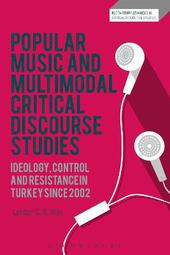
|
Popular Music and Multimodal Critical Discourse Studies: Ideology, Control and Resistance in Turkey since 2002
Hardback
Main Details
| Title |
Popular Music and Multimodal Critical Discourse Studies: Ideology, Control and Resistance in Turkey since 2002
|
| Authors and Contributors |
By (author) Dr Lyndon C. S. Way
|
| Series | Bloomsbury Advances in Critical Discourse Studies |
|---|
| Physical Properties |
| Format:Hardback | | Pages:216 | | Dimensions(mm): Height 234,Width 156 |
|
| Category/Genre | Music - styles and genres |
|---|
| ISBN/Barcode |
9781350016446
|
| Classifications | Dewey:781.6409561 |
|---|
| Audience | | Tertiary Education (US: College) | |
|---|
|
Publishing Details |
| Publisher |
Bloomsbury Publishing PLC
|
| Imprint |
Bloomsbury Academic
|
| Publication Date |
28 December 2017 |
| Publication Country |
United Kingdom
|
Description
Popular music has long been used to entertain, provoke, challenge and liberate but also to oppress and control. Can popular music be political? What types of popular music work best with politics? How can songs, videos, concerts or any other musical commodity convey ideas about power, politics and identity? Using Multimodal Critical Discourse Studies (MCDS), this book reveals the deeply political role played by popular music. Lyndon Way demonstrates how MCDS can provide important and timely insights on the political nature of popular music, due to its focus on how communication takes place, as well as its interest in discourse and how ideologies are naturalised and legitimised. The book considers the example of contemporary Turkish society, with its complex and deep ideological divisions increasingly obvious under the stewardship of President Recep Tayyip Erdogan and his centre-right political party, in power since 2002. It looks at how the authorities seek to harness and control popular music and considers a wide range of popular music genres including rock, rap, protest and folk music. It shows how official promotional videos, protest cut-and-paste offerings, party-political election songs, live music events and internet discussions about popular music emerge as sites of power and resistance in certain venues and particularly across social media. Throughout the book, Lyndon Way shows that popular music is also deeply political.
Author Biography
Lyndon C. S. Way is Lecturer in the Department of Communication and Media, School of the Arts, at the University of Liverpool, UK.
ReviewsIn an era of global democratic decline where fundamental liberties are at risk nor only outside by also increasingly within the West, a detailed study into how opposing voices can be expressed in creative outlets makes this study a very valuable one with implications that go beyond the Turkish case ... Overall, [this book] does a fine job of analysing multimodal sources from different discursive sites in exploring the different ways in which such expression takes place. * Journal of Language and Politics * The critical study of musical discourse has only just begun. If it is now getting a new impetus, this is to a large extent due to the pioneering work of Lyndon Way, both in an edited book based on a symposium at CADAAD 2014 in Budapest ... and in his new book. * CADAAD Journal * Through his sophisticated and subtle theoretical approach, Lyndon Way offers us a meticulous and nuanced account of the relationship between music and politics. He does so by concentrating on the fascinating case of Turkey, but his insights help illuminate many other instances of the complex interplay of song and sentiment. He makes video images, performances, social media and lyrics part of his story, but he never lets us forget the most crucial element of all: the sound itself. -- Professor John Street, Professor of Politics, University of East Anglia, UK Music has always been political. It can powerfully support the powerful and equally powerfully unite people against them in protest. Never more so than in contemporary Turkey, and Lyndon Way reports from the field, making us experience the politics and the music close up, but also analyzing astutely how political music works - in political advertisements, videos and concerts, and with images, words and, above all, music itself. -- Theo Jacob van Leeuwen, Syddansk Universitet, Denmark. Lyndon Way has produced a valuable study which is of interest not only in terms of its particular focus - politicised music in Turkey - but also for its theoretical contribution to the emerging field of Multimodal Critical Discourse Studies. Multimodal methods should be helpful to undergraduate and postgraduate students who want to take a broad approach to the critical study of music in general and politicised popular music in particular. Meanwhile, those who have little or no prior knowledge of Turkish music and politics will learn a great deal from this enjoyable and thought-provoking text. -- Pete Dale, Senior Lecturer in Popular Music, Manchester Metropolitan University, UK.
|